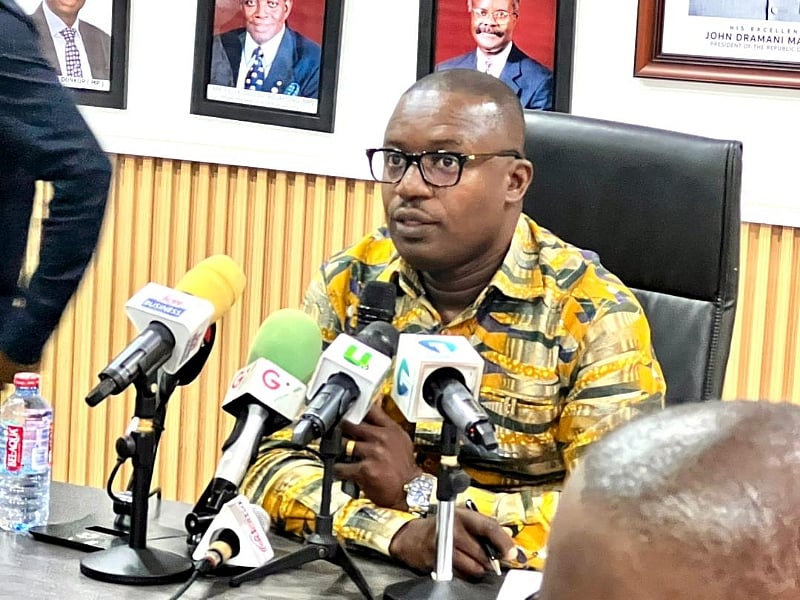Ghana’s energy sector stands at a critical juncture, facing significant financial and operational challenges that necessitate urgent reforms. Minister of Energy and Green Transition, John Abdulai Jinapor, has underscored the government’s commitment to addressing these issues, particularly within the power distribution sector. The core of the government’s strategy centers around exploring private sector participation in power distribution, a move aimed at enhancing efficiency, reducing losses, and alleviating the financial burden on the sector. To navigate this complex undertaking, the Minister has inaugurated a six-member committee tasked with comprehensively consulting stakeholders and recommending the optimal model for private sector involvement.
The Minister’s emphasis on the urgency of the situation underscores the precarious state of Ghana’s energy sector. He highlighted the staggering 40% loss rate at the Electricity Company of Ghana (ECG), encompassing technical, commercial, and collection losses. This level of inefficiency, he stressed, is unsustainable for any utility company and poses a severe threat to the entire power sector’s viability. Contributing to these losses are operational inefficiencies, such as the significant demurrage costs incurred at the Tema Harbour due to stranded containers. These costs alone are estimated to be a staggering 1.5 billion cedis, further exacerbating the financial strain on the sector.
Beyond operational inefficiencies, the energy sector carries a substantial debt burden of approximately $3 billion. This debt, coupled with the ongoing financial obligations to Independent Power Producers (IPPs), has created a precarious financial situation that demands immediate attention. The Minister warned that failure to address the distribution sector’s challenges could lead to the collapse of the entire power sector, highlighting the critical nature of the reforms being pursued.
The newly formed committee, comprising seasoned professionals with extensive experience in the energy sector, will play a crucial role in shaping the future of Ghana’s power distribution. Led by industry veteran Jabesh Amisah-Arthur, the committee’s mandate is to engage in broad consultations with a diverse range of stakeholders. This includes consumers, industrial players, labor unions, and technical experts, ensuring a comprehensive understanding of the various perspectives and interests at play.
Central to the committee’s deliberations will be the prioritization of local content participation. The Minister emphasized the government’s commitment to ensuring that local businesses and expertise are meaningfully involved in the reform process, both during consultations and subsequent implementation. This emphasis reflects a broader policy objective of fostering local economic development and maximizing the benefits of the reforms for Ghanaian businesses and workers.
The committee’s charge is to thoroughly assess the various models for private sector participation and recommend the most suitable approach for Ghana’s specific context. This involves evaluating the potential benefits and risks of different models, considering the implications for consumers, businesses, and the overall stability of the energy sector. The Minister expressed confidence in the committee’s expertise and integrity, emphasizing their ability to deliver the necessary recommendations for a successful transformation of the sector.
The committee faces a tight deadline of one month to complete its consultations and present its recommendations. However, the Minister acknowledged that the timeline could be extended if necessary to ensure a thorough and comprehensive review. This flexibility underscores the government’s commitment to a robust and well-considered approach to these critical reforms.
The success of this initiative hinges not only on the committee’s work but also on the broader public’s support and engagement. The Minister appealed to the public to actively participate in the consultative process and contribute to finding solutions that benefit all stakeholders. He pledged the government’s full support to the committee, ensuring they have the necessary resources and backing to fulfill their mandate.
The Minister’s appeal for public support reflects the government’s recognition that these reforms are a collective endeavor. Transforming the energy sector requires buy-in from all segments of society, ensuring that the chosen path is sustainable, equitable, and serves the best interests of Ghana’s citizens. The government’s commitment to transparency and inclusivity in this process is crucial for building public trust and ensuring the long-term success of the reforms.
The urgency of the situation, coupled with the complexities of private sector involvement, necessitates a carefully planned and executed strategy. The government’s approach, centered around the expert committee’s deliberations and broad stakeholder consultations, demonstrates a commitment to a comprehensive and inclusive process. The focus on local content participation further reinforces the government’s dedication to ensuring that the reforms benefit Ghana’s economy and its people.
The challenges facing Ghana’s energy sector are substantial, but the government’s proactive approach, combined with the expertise of the newly formed committee, offers a path towards a more sustainable and efficient energy future. The success of these reforms will be instrumental in stabilizing the sector, reducing losses, and ultimately providing reliable and affordable energy to the people of Ghana.
The Minister’s emphasis on urgency and his call for public support underscores the collaborative nature of this endeavor. The transformation of Ghana’s energy sector requires a collective effort, with all stakeholders working together to address the challenges and build a more resilient and prosperous future. The government’s commitment to transparency, inclusivity, and local content participation lays the foundation for a sustainable and equitable energy sector that benefits all Ghanaians.
The committee’s work will be closely watched as it navigates the complexities of private sector participation in power distribution. Their recommendations will shape the future of Ghana’s energy sector and play a critical role in determining its long-term viability. The government’s commitment to supporting the committee and engaging with stakeholders signals a determination to overcome the current challenges and create a more secure and sustainable energy landscape for the nation.
The government’s proactive approach to reforming the energy sector, coupled with its commitment to transparency and stakeholder engagement, holds the promise of a brighter future for Ghana’s energy landscape. By addressing the critical challenges facing the sector, implementing necessary reforms, and fostering private sector involvement, the government aims to create a more efficient, reliable, and sustainable energy system that supports economic growth and improves the lives of all Ghanaians.


